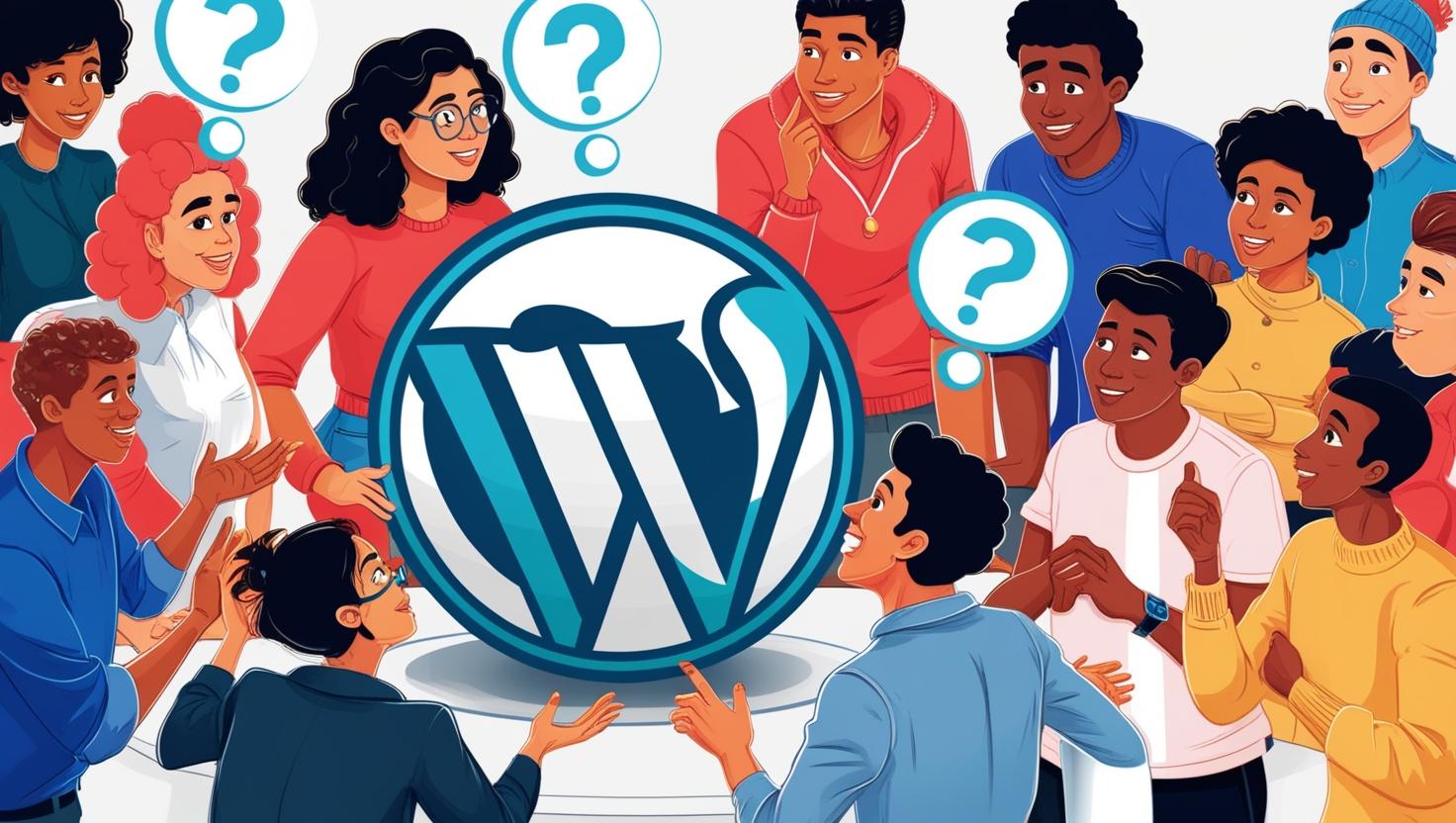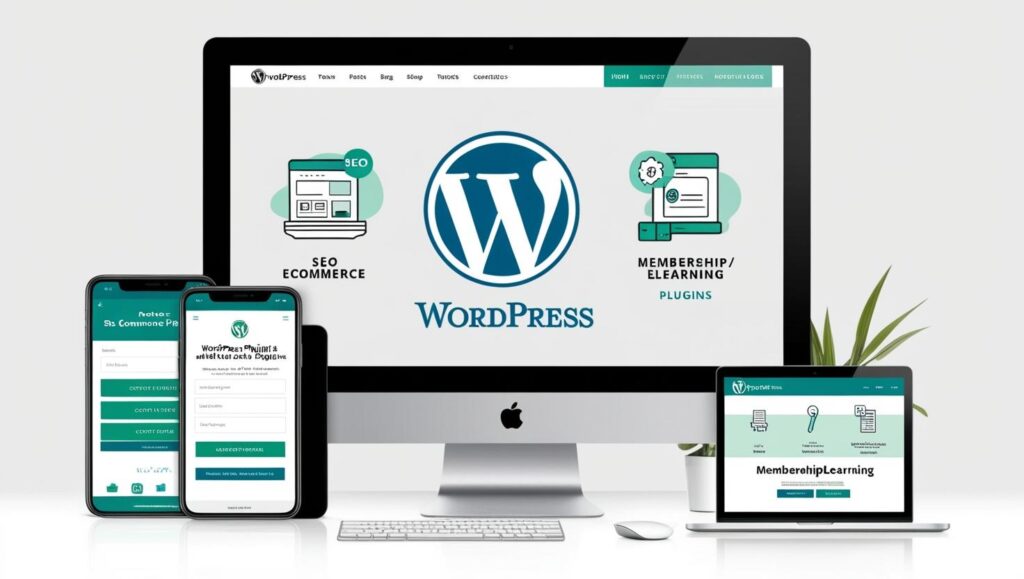What is WordPress? 7 Powerful Reasons It’s the Best Choice for Your First Website

Have you ever wondered how websites come to life? From blogs and business sites to online stores and portfolios, WordPress powers over 40% of all websites on the internet. But what is it, and why is it so popular among entrepreneurs and digital marketers?
In today’s fast-paced digital world, having an online presence is crucial for success. Whether you’re launching your first online business or looking for a flexible way to create a professional website, WordPress offers a user-friendly, powerful, and scalable solution. Best of all, it doesn’t require advanced technical skills to get started.
In this article, we’ll break down everything you need to know about, including its key features, benefits, and how to set up your first site. By the end, you’ll understand why it is the go-to platform for millions of people worldwide – and how it can help you build the website of your dreams.
What is WordPress?
At its core, WordPress is a powerful and versatile Content Management System (CMS) that allows users to create and manage websites without needing to write code. Originally launched in 2003 as a simple blogging platform, it has evolved into the most popular website builder in the world, powering over 40% of all websites.
What makes it stand out is its flexibility. Whether you want to start a personal blog, build a professional business site, or create a fully functional online store, it has the tools and features to bring your vision to life. It’s an open-source platform, meaning the software is free to use and constantly improved by a global community of developers.
Unlike other website builders that can be restrictive, WordPress gives you complete control over your site’s design, functionality, and content. With thousands of customizable themes and plugins available, the possibilities are virtually endless.
The Key Features of WordPress
One of the reasons it has become the go-to platform for millions of website owners is its rich set of features. Let’s explore the key aspects that make it a top choice for digital marketers, entrepreneurs, and beginners:
1. Open-Source Software
WordPress is open-source, meaning it’s free to download, use, and modify. This gives users complete control over their websites and access to an ever-growing library of community-driven tools and updates.
2. Easy-to-Use Interface
You don’t need to be a developer to use it. Its intuitive dashboard makes it easy to manage your content, customize your site, and install additional features with just a few clicks.
3. Customizable Themes and Plugins
There are thousands of free and premium themes to change your site’s design instantly. Plugins allow you to add features like contact forms, SEO optimization, or even e-commerce functionality without coding.
4. SEO-Friendly Structure
Search engines love it! It’s designed to produce clean, readable code and includes built-in tools to help your website rank higher in search results. You can also enhance SEO with popular plugins like Yoast SEO or Rank Math.
5. Mobile-Responsive Design
With mobile browsing on the rise, having a responsive website is crucial. Most themes are mobile-friendly, ensuring your site looks great on any device.
What Are The Benefits?
Let’s take a closer look at why WordPress is such a powerful tool for entrepreneurs and digital marketers:
1. Cost-Effective
WordPress itself is free, and many themes and plugins are available at no cost. While premium options exist, you can build a professional-looking site on a tight budget.
2. Scalable for Growth
Whether you’re running a small blog or a growing e-commerce site, it can scale with your business. You can easily add new features, pages, or products as your business expands.
3. Large Community and Support
With millions of users worldwide, it boasts an active community of developers and users. If you run into issues, you’ll find countless tutorials, forums, and resources to help.

WordPress for Beginners
If you’re new to building websites, it is one of the best platforms to start with. Its beginner-friendly design ensures that even those with no technical background can create a professional, functional website. Here’s why it is ideal for first-time website owners:
1. Simple Setup Process
Getting started with WordPress is as easy as choosing a hosting provider, installing the software, and selecting a theme. Many hosting providers, like Bluehost and SiteGround, offer one-click installations, making the process seamless for beginners.
2. Intuitive Dashboard
The dashboard is clean and straightforward, allowing you to manage pages, posts, and media effortlessly. You’ll find all the tools you need in one place, making it easy to edit content and update your site.
3. Endless Customization Options
WordPress offers plenty of free themes to help you design your site quickly. If you want more functionality, plugins like Elementor and WPForms allow you to customize layouts, create contact forms, and more—no coding required.
There is an amazing website out there called WPBeginner that has hundreds, if not thousands of super helpful articles about using WordPress at all levels and is a highly recommended resource to check out and to learn from. Visit WPBeginner here.
How To Get Started
Ready to dive in? Follow these simple steps to launch your first WordPress site:
Step 1: Choose a Hosting Provider
Your website needs a home, and that’s where hosting comes in. Popular providers like Bluehost, SiteGround, and HostGator offer reliable hosting, often with free domain names and SSL certificates. If you would like more information on hosting providers, check out our article here: Website Hosting 101: What Small Business Owners and Bloggers Need to Know for a complete and simplified breakdown.
Step 2: Install WordPress
Most hosting providers make it easy to install with a single click. Once installed, you’ll gain access to your dashboard, where the magic happens.
Step 3: Pick a Theme
Browse the theme directory for free options or invest in premium themes for a more polished look. Choose a theme that aligns with your business goals and audience. If you would like more information on Themes, check out our article here: Choosing The Right WordPress Theme for a breakdown on what to consider, as well as some of our favourites to use.
Step 4: Install Essential Plugins
Plugins add functionality to your site. Start with these must-haves:
- Yoast SEO for search engine optimization
- Elementor for drag-and-drop page building
- Akismet to block spam comments
- WooCommerce (if you’re creating an online store)
Step 5: Create Your First Page or Post
With everything set up, start creating! Whether it’s a blog post or an “About” page, WordPress makes it easy to add and format content.
WordPress vs. Other CMS
When choosing a platform, it’s helpful to compare with other popular Content Management Systems. Here’s how it stacks up against its competitors:
WordPress vs. Wix
- Flexibility: WordPress offers more customization options, while Wix is more limited.
- Cost: Both have free versions, but WordPress can be more cost-effective in the long run.
- Control: WordPress gives full control over your site, while Wix’s drag-and-drop builder is more restrictive.
You can view Wix and it’s plans here.
WordPress vs. Squarespace
- Ease of Use: Squarespace is slightly easier for complete beginners but lacks WordPress’s flexibility.
- Customization: WordPress has thousands of themes and plugins, while Squarespace has fewer design options.
- SEO: Both are SEO-friendly, but WordPress’s tools give you more advanced optimization options.
You can view Squarespace and it’s plans here.
WordPress vs. Shopify
- Purpose: Shopify is designed for e-commerce, while WordPress can handle various site types.
- Cost: Shopify’s plans are pricier, but its e-commerce tools are more streamlined.
- Flexibility: WordPress, with WooCommerce, offers more control over your online store.
You can view Shopify and it’s plans here.

Popular Plugins and Themes
WordPress’s true power lies in its ability to extend functionality with plugins and themes. Here are a few must-haves:
Popular Plugins
- Yoast SEO: Optimize your site’s content for search engines.
- Elementor: Design custom pages with a drag-and-drop interface.
- WooCommerce: Turn your site into a fully functional online store.
- UpdraftPlus: Backup and restore your site with ease.
- WP Super Cache: Improve site speed and performance.
Popular Themes
- Astra: Lightweight, fast, and highly customizable.
- OceanWP: Ideal for beginners and compatible with page builders.
- Divi: A premium theme with built-in drag-and-drop design features.
- Neve: Perfect for small businesses and blogs, with a clean design.
Conclusion
WordPress is a game-changer for anyone looking to build a website, whether you’re a complete beginner or a seasoned entrepreneur. Its ease of use, flexibility, and vast ecosystem of themes and plugins make it the ideal platform for creating any type of site—from blogs and portfolios to online stores.
Now that you know what it is and how to get started, it’s time to take the first step. Choose a hosting provider, install WordPress, and start building your dream website today!
Bonus Tips To Get the Most Out of WordPress
Now that you have a solid understanding of WordPress, here are a few additional tips to help you maximize its potential and create a standout website:
1. Keep Your Site Secure
Website security is crucial, especially if you’re running an online business. Use plugins like Wordfence or Sucuri Security to protect your site from hackers and malware. Regularly update your WordPress version, themes, and plugins to stay ahead of potential vulnerabilities.
2. Optimize Your Site for Speed
A fast-loading website improves user experience and boosts your SEO rankings. Install a caching plugin like WP Super Cache or W3 Total Cache, and use image optimization tools like Smush or TinyPNG to reduce image file sizes without compromising quality.
3. Leverage SEO to Drive Traffic
With the right SEO practices, WordPress can help your site rank higher on search engines. Use tools like Yoast SEO to optimize your content, focus on relevant keywords, and structure your site with clear headings, meta descriptions, and alt text for images.
4. Take Advantage of Analytics
Track your website’s performance with tools like Google Analytics or MonsterInsights. These insights will help you understand your audience, monitor traffic, and refine your content strategy for better results.
5. Experiment with Page Builders
If you want more control over your site’s design, try page builders like Elementor or Beaver Builder. These tools allow you to create stunning, professional layouts without any coding knowledge.
6. Engage Your Audience with Blogging
A blog is an excellent way to provide value to your audience and build trust. Share industry insights, how-to guides, or success stories that resonate with your readers. Consistent, high-quality content will help establish your authority and attract more visitors.
7. Regularly Backup Your Site
Unexpected issues can arise, so it’s essential to have a backup plan. Use plugins like UpdraftPlus or BackupBuddy to schedule regular backups and ensure your data is safe.
WordPress opens up a world of possibilities for digital marketers, entrepreneurs, and anyone looking to establish an online presence. Its user-friendly nature, combined with powerful customization options, makes it a platform that grows with you. Whether you’re starting a personal blog or launching a thriving e-commerce business, WordPress is your gateway to success.